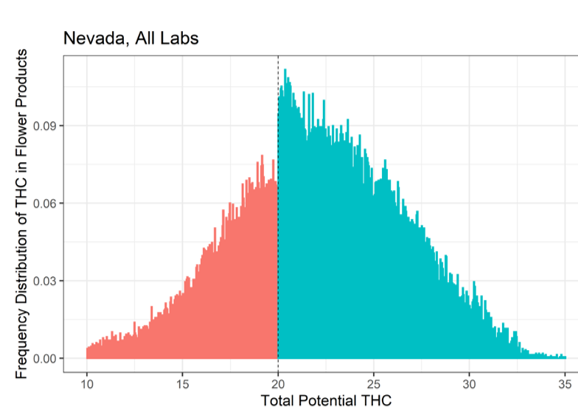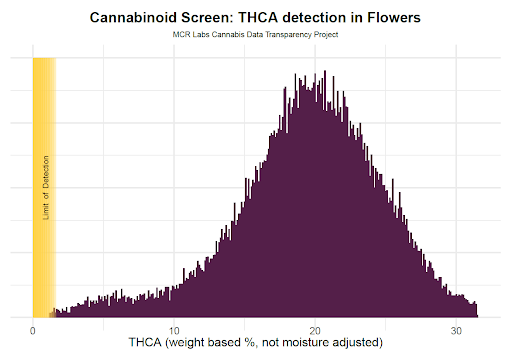The Data Problem in Cannabis
How economic incentives have corrupted cannabis data.

When a consumer or patient visits a dispensary, there is one metric they are almost always basing their purchasing decision on – the THC potency.
THC, the decarboxylated form of THCa and the cannabinoid responsible for the plant’s euphoric effect, has become the primary marker of quality in today’s market. The cannabinoid is what cannabis is famous for, and despite the wide array of valuable compounds the plant brings to the table, THC is what consumers and thus dispensaries are currently chasing.
The Problem
The higher the THC percentage, the more a cultivator can sell their flower for. This creates an economic incentive for higher THC numbers. In order for cultivators to stay competitive within their wholesale markets, they now have to find ways to increase the cannabinoid production in their product. There are a few ways in which a cultivator could encourage higher cannabinoid production in the plant, but most of these strategies involve money and resources. An easier and cheaper option is to simply pick a testing lab that will provide the desired data – the highest THC count.
While independent testing labs have to obtain ISO accreditation to operate, there is little standardization beyond that. Labs who are struggling to keep clients may be inclined to adjust their methods to produce higher THC numbers. On the other hand, cultivators under pressure have their own ways they could ensure higher numbers. For example, sprinkling kief on a flower sample is an easy way to increase the THC percentage.
No matter who is to blame, the effect is real – most cannabis product labels on the market today can’t be trusted to provide accurate information to consumers and patients. Without real data to rely on, it’s much harder to calculate an appropriate dose. Safety data is also at risk, as cultivators are more likely to send their product to a testing lab that won’t fail their samples for contaminants like mold. For immunocompromised patients, exposure to mold can be a health hazard.
Now that we’ve established the threat that inaccurate data poses to public safety, let’s talk about how to tell when data has been compromised.
How to Spot a Data Problem
Most licensed cannabis markets use METRC, a seed-to-sale system that tracks cannabis from seed through harvest and testing to sale. This platform houses all the testing data for all the cannabis products sold within Massachusetts, Colorado, California, and more. In most states, this data is not publicly available. Curious consumers, researchers, data scientists, and anyone else interested in the data have to rely on the product labels provided by the producer. Or, they can file a public records request, like Michael Zoorob did.
Zoorob obtained testing data from Nevada state dating between December 2017 to January 2020 and found an “unusual spike in the frequency of products reporting just higher than 20% THC.” Below, you can see a graph from his study that illustrates the spike.

The dramatic spike is a clear marker of manipulation. If the data were clean, it would show approximately as many flower products testing just below 20% THC as it does above. For comparison, below is a graph illustrating the distribution of THC in flower samples tested at MCR Labs in Massachusetts.

When it comes to Massachusetts, we have no idea what the data will look like. The data is currently only accessible by the Cannabis Control Commission. Jeff Rawson, a former Harvard postdoctoral fellow in chemistry and the founder of the nonprofit Institute of Cannabis Science, has conducted his own study by testing samples off the shelf.
He used three different labs for this study, and found that while all three labs had results consistent with each other, the results differed greatly from what was advertised on the label.
So, we do have some indication that cannabis labels are inaccurate in Massachusetts. Now, what can we do about it?
Possible Solutions
The cheapest and fastest way for any state to address their cannabis data problem would be to publish compliance testing results. Making the data public will allow data scientists to conduct their own research that would hold bad actors accountable. It will also send a message about transparency, creating an incentive for both labs and producers to utilize honest business practices.
Frequent and consistent off-the-shelf testing conducted by the Cannabis Control Commission would also create a deterrent against data manipulation, but only if there are repercussions for those who are caught.
While there are other costly and more laborious solutions, such as a state run & funded standards lab, these two actions could be taken up immediately and send a clear message to the Massachusetts market: data manipulation and scientific fraud will not be tolerated.
The data is what separates the legal market from the unregulated market. If consumers and patients can’t trust the product labels, they might as well buy cheaper products from the unregulated market. The data problem could destroy this industry’s credibility if we let it – or, we could put the right incentives in place to encourage an honest and thriving legal cannabis market.
